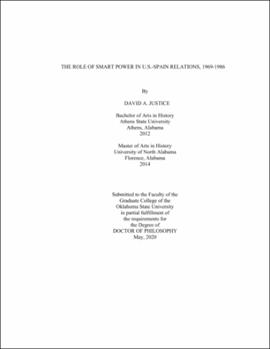| dc.contributor.advisor | Belmonte, Laura | |
| dc.contributor.author | Justice, David A. | |
| dc.date.accessioned | 2020-09-09T20:49:13Z | |
| dc.date.available | 2020-09-09T20:49:13Z | |
| dc.date.issued | 2020-05 | |
| dc.identifier.uri | https://hdl.handle.net/11244/325441 | |
| dc.description.abstract | This dissertation offers a dual inquiry into the balance of U.S. defensive and cultural diplomacy with Spain during the transition to democracy mainly from an American perspective. First, it explores how the United States used hard power with Spain to maintain control of the military bases but employed soft power to offset anti-Americanism. These negotiations provided Spain with economic assistance and promised integration into the West via the North Atlantic Treaty Organization (NATO) and the European Community (EC), both of which Spain coveted, However, once the Spanish transition began, the United States emphasized soft power. These tactics included public diplomacy, educational exchanges, television, and human rights rhetoric. The United States Information Agency (USIA) utilized public diplomacy on themes as diverse as the Apollo space program, democracy promotion, and economic rights to build goodwill in Spain for Americans. The Fulbright program attempted to win hearts and minds in Spain through American Studies programs and educational exchanges. The USIA engaged television as a method to reach the Spanish general public with documentaries and programs that illustrated U.S.-Spanish cultural understanding. For human rights, the presidents often used Spain as an example to the world of how to transition to democracy peacefully and promote human rights. | |
| dc.description.abstract | Second, this study examines how nongovernmental organizations (NGOs) played a role in the development of U.S. soft power. Through education, the Ford Foundation (FF) helped Spain develop and institute educational reforms while the preoccupation of Fulbright was with American Studies promotion and educational exchanges. For television, Children's Television Workshop (CTW) developed an international co-production of Sesame Street for Spain that Television Espanola (TVE) intended to use to develop a national identity. However, the American NGO's lack of cultural understanding of Spain nearly caused Barrio Sesamo to end prematurely. Amnesty International (AI) along with other NGOs provided evidence of human rights violations in Spain while American presidents made speeches about how Spain's transition represented the importance of human rights. Each of these NGOs directly or indirectly influenced the development of U.S. soft power in Spain. | |
| dc.format | application/pdf | |
| dc.language | en_US | |
| dc.rights | Copyright is held by the author who has granted the Oklahoma State University Library the non-exclusive right to share this material in its institutional repository. Contact Digital Library Services at lib-dls@okstate.edu or 405-744-9161 for the permission policy on the use, reproduction or distribution of this material. | |
| dc.title | Role of smart power in U.S.-Spain relations, 1969-1986 | |
| dc.contributor.committeeMember | Miller, Douglas | |
| dc.contributor.committeeMember | Schauer, Matthew | |
| dc.contributor.committeeMember | Alvarez-Sancho, Isabel | |
| osu.filename | Justice_okstate_0664D_16640.pdf | |
| osu.accesstype | Open Access | |
| dc.type.genre | Dissertation | |
| dc.type.material | Text | |
| dc.subject.keywords | global 1970s | |
| dc.subject.keywords | human rights | |
| dc.subject.keywords | smart power | |
| dc.subject.keywords | television | |
| dc.subject.keywords | u.s.-spain relations | |
| thesis.degree.discipline | History | |
| thesis.degree.grantor | Oklahoma State University | |
